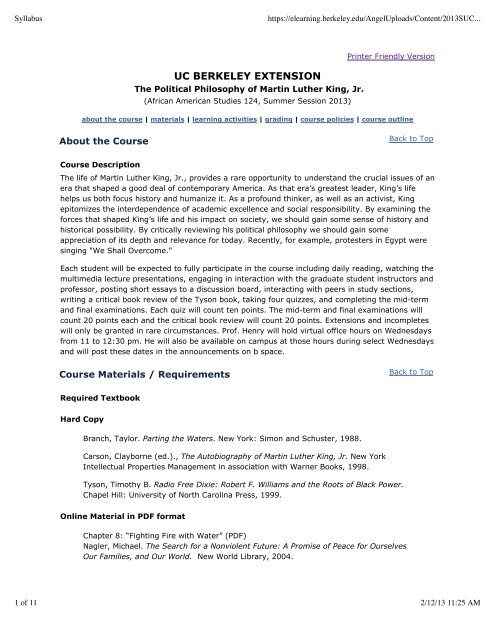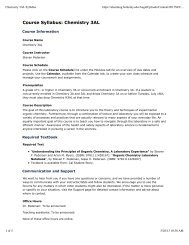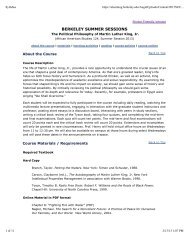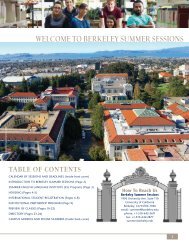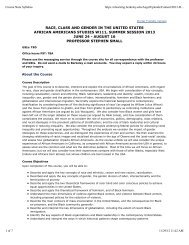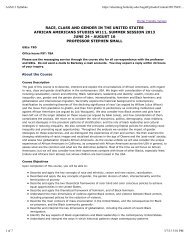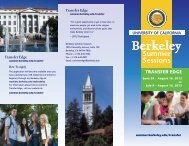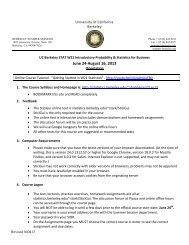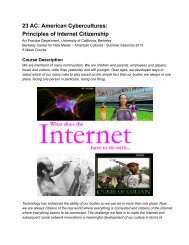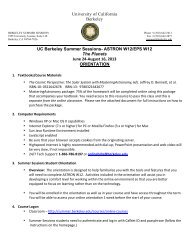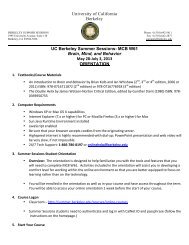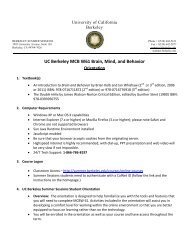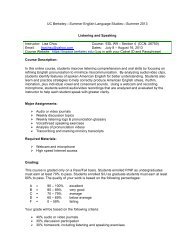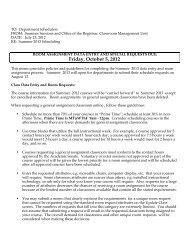UC BERKELEY EXTENSION - Berkeley Summer Sessions
UC BERKELEY EXTENSION - Berkeley Summer Sessions
UC BERKELEY EXTENSION - Berkeley Summer Sessions
You also want an ePaper? Increase the reach of your titles
YUMPU automatically turns print PDFs into web optimized ePapers that Google loves.
Syllabushttps://elearning.berkeley.edu/AngelUploads/Content/2013S<strong>UC</strong>...<strong>UC</strong> <strong>BERKELEY</strong> <strong>EXTENSION</strong>The Political Philosophy of Martin Luther King, Jr.(African American Studies 124, <strong>Summer</strong> Session 2013)Printer Friendly Versionabout the course | materials | learning activities | grading | course policies | course outlineAbout the CourseBack to TopCourse DescriptionThe life of Martin Luther King, Jr., provides a rare opportunity to understand the crucial issues of anera that shaped a good deal of contemporary America. As that era’s greatest leader, King’s lifehelps us both focus history and humanize it. As a profound thinker, as well as an activist, Kingepitomizes the interdependence of academic excellence and social responsibility. By examining theforces that shaped King’s life and his impact on society, we should gain some sense of history andhistorical possibility. By critically reviewing his political philosophy we should gain someappreciation of its depth and relevance for today. Recently, for example, protesters in Egypt weresinging "We Shall Overcome."Each student will be expected to fully participate in the course including daily reading, watching themultimedia lecture presentations, engaging in interaction with the graduate student instructors andprofessor, posting short essays to a discussion board, interacting with peers in study sections,writing a critical book review of the Tyson book, taking four quizzes, and completing the mid-termand final examinations. Each quiz will count ten points. The mid-term and final examinations willcount 20 points each and the critical book review will count 20 points. Extensions and incompleteswill only be granted in rare circumstances. Prof. Henry will hold virtual office hours on Wednesdaysfrom 11 to 12:30 pm. He will also be available on campus at those hours during select Wednesdaysand will post these dates in the announcements on b space.Course Materials / RequirementsBack to TopRequired TextbookHard CopyBranch, Taylor. Parting the Waters. New York: Simon and Schuster, 1988.Carson, Clayborne (ed.)., The Autobiography of Martin Luther King, Jr. New YorkIntellectual Properties Management in association with Warner Books, 1998.Tyson, Timothy B. Radio Free Dixie: Robert F. Williams and the Roots of Black Power.Chapel Hill: University of North Carolina Press, 1999.Online Material in PDF formatChapter 8: “Fighting Fire with Water” (PDF)Nagler, Michael. The Search for a Nonviolent Future: A Promise of Peace for OurselvesOur Families, and Our World. New World Library, 2004.1 of 11 2/12/13 11:25 AM
Syllabushttps://elearning.berkeley.edu/AngelUploads/Content/2013S<strong>UC</strong>...Holy Bible, "The Sermon on the Mount"*Chapter 1: "Solo"-- The Mystery of Stanley Levison (PDF)Garrow, David. The FBI and Martin Luther King, Jr. Harmondsworth, Middlesex,England; New York, N.Y. Penguin Books, 1983, 1981.Chapter 6: Enforcement and Effects: The Voting Rights Act and Black PoliticalParticipation in the South, 1965-1976 (PDF)Garrow, David. Protest at Selma: Martin Luther King, Jr., and the Voting Rights Act of1965. New Haven, Conn.: Yale University Press, 1978.Chapter 5: Election Reform: Revisiting the Right to Vote (PDF)Ronald Walters, Freedom is Not Enough: Black Voters, Black Candidates, and AmericanPresidential Politics. Lanham, Md.: Rowan & Littlefield, 2005.Chapter 1: The Religion of the Slave (PDF)Wilmore, Gayraud. Black Religion and Black Radicalism. Garden City, N.Y.: Doubleday,1972.Chapter 1: Where Are We? (PDF)King, Jr., Martin Luther. Where Do We Go From Here? New York: Harper & Row, 1967.Chapter 1: "I Am a Man" (PDF)Posner, Gerald. Killing the Dream: James Earl Ray and the Assassination of MartinLuther King, Jr. New York: Random House, 1998.Information about ordering textbooks can be found in the Course Information folder near the top ofthe Modules tab page.Learning ActivitiesBack to TopEach student will be expected to fully participate in the course including daily reading, watching themultimedia lecture presentations, engaging in interaction with the graduate student instructors andprofessor, posting short essays to a discussion board, interacting with peers in study sections,writing a critical book review of the Tyson book, taking four quizzes, and completing the mid-termand final examinations. Each quiz will count ten points. The mid-term and final examinations willcount 20 points each and the critical book review will count 20 points. Extensions and incompleteswill only be granted in rare circumstances. Prof. Henry will hold virtual office hours on TBA. He willalso be available on campus at those hours and will post these dates in the announcements on bspace.Reading AssignmentsRead the assigned chapters for the Module. View the assigned multimedia presentations. Themodule learning objectives and multimedia lectures will provide an overview to assist students infocusing their study for quizzes, assignments, and research study.Readings and Multimedia are listed under each respective Module # button.Specific reading assignments are listed on the Course Schedule and in the specific Modules.Multimedia AssignmentsA list of PowerPoint lectures can be located on the Course Schedule and in the specific modules.Links to the PowerPoint lectures can be found within each Module. Note that for each narrated2 of 11 2/12/13 11:25 AM
Syllabushttps://elearning.berkeley.edu/AngelUploads/Content/2013S<strong>UC</strong>...PowerPoint lecture, there is also a “PDF handout.” This supplement is available for printing andnote taking.DiscussionsThe purpose of the online discussion board is to create a group knowledge base. Please share yourexperiences, thoughts, outside references, and any insights you have gained from our assignedreadings. Comments should provide insight and encourage meaningful discussion. Comments suchas "I agree" are not appropriate unless accompanied by statements that qualify the commentthrough personal experience or references. Post a response that uses proper sentence structure,spelling and grammar; points will be deducted for misspelling and improper grammar.Acknowledge and show respect for the diversity of opinions presented by your classmates.Post your response to each discussion question as a reply to the topic message. This way theMessage Board will be properly threaded and easy to read. If you mispost a message, simply copythe content of the message, then delete the message and repost it.Discussions are expected to be posted by the due date each week. If they are late, 5 points will bededucted from the final grade.Drop BoxSubmit your written assignments by attaching the document to its specified drop box. If attachinga Word-processed file, save it in rich text format (.rtf) or as a text file (.txt) before attaching. Keepcopies of all your work.Book ReviewThe Book Review will act as a measure of how well you can articulate your understanding of thematerial presented. It should be approximately 1500 to 2000 words in length. Adhere to thefollowing guidelines to receive full credit for the review:1.2.3.4.5.6.7.8.Follow directions.Share thoughts, experiences, and insight on the chosen topic.You may need to use other resources besides the required texts to present your views.If applicable, display decision-making and problem-solving skills.Write in complete sentences, using proper punctuation, grammar, and spelling rules.Submit using the Drop Box in Angel by the due date.Submit documents in Microsoft Word.Cite all references using the APA format.Additional Guidelines can be found in Module Eight.Submitting AssignmentsIt is important to start the course soon and begin submitting work regularly. Your assignments willbe submitted through the Drop Box or Discussion Boards.Virtual Office Hours - ChatsThe Course Instructor/Facilitator will set virtual office hours when students can communicate realtime (synchronously). While these chats are optional they can be valuable for case studydiscussion, answering questions, or reviewing for quizzes. Students can log into their CourseFaculty/Facilitator’s chat room by clicking on Chat >Join (next to Course Faculty/Facilitator’sname). Faculty/Facilitator chats are optional; no points are awarded for participation. Days and3 of 11 2/12/13 11:25 AM
Syllabushttps://elearning.berkeley.edu/AngelUploads/Content/2013S<strong>UC</strong>...times for Instructor/Facilitator Virtual Office Hours are posted on the course site under Faculty &Staff as well as on the Chat page.Mid-term ExaminationThe mid-term examination will consist of multiple essay questions. Once you begin the exam, youwill have 1 hour and 20 minutes to complete it. Students will be able to review their grade uponcompletion of the exam.Final ExaminationAfter you have completed all the other requirements, you will take a three-hour, proctored,closed-book final exam, on Friday, August 16th, time and location TBA. There will be nomake-up exam. You must pass the final exam to receive credit for the course. All examinationsare closed book. Any violation of this closed book policy will result in failure of courseand possible academic suspension. If you will not be on campus for the final, it might bepossible to take a proctored final off campus; contact Tracie Littlejohn atsummer_online_support@berkeley.edu (not the professor) to make arrangements. Proctorapplications are due by July 26, 2013.QuizzesThere will be 4 multiple-choice quizzes. Each quiz will consist of 10 to 20 questions. Once you begina quiz, you will have 30 minutes to complete.Students will be able to review their grade upon completion of the quiz.All quizzes are closed book. Any violation of this closed book policy will result in failureof course and possible academic suspension.Refer to Course Schedule for dates.Course Evaluation<strong>UC</strong> <strong>Berkeley</strong> Extension is committed to improving our online courses and instruction. Please take afew minutes to participate in our End of Course Evaluation to share your opinions about thiscourse. We are interested in your online learning experience, and your candid feedback will help usplan for the future and make improvements. Please take the survey before your course End Date.You may only take the survey once.The evaluation does not request any personal information, and your responses will remain strictlyconfidential.To access the evaluation, please follow the link near the bottom of the Modules tab page.Reminder: Your Course End DateYour access to the online classroom will expire on the course End Date, which is indicated in theinitial e-mail you received when you enrolled. As you work through the course, please keep the EndDate in mind, and if you want to save any commentary or assignments for future reference, pleasemake sure to print or copy/paste those materials before your access ends.Credit RequirementsBack to TopCourse grades are based on the following:4 of 11 2/12/13 11:25 AM
Syllabushttps://elearning.berkeley.edu/AngelUploads/Content/2013S<strong>UC</strong>...AssignmentModule1Module2Module3Module4Module5Module6Module7Module8TotalPointsQuizzes 10 10 10 10 40Exams 20 20 40Book Review 20 20DiscussionsDiscussions are expected to be posted by the due date each week. Ifthey are late, 5 points will be deducted from the final grade.Total points 10 10 20 10 10 40 100Grading InformationFinal grades are assigned according to the following percentages:LetterGradeA A- B+ B B- C+ C C- D+ D D- FPercentage 100-94 93-90 89-86 85-83 82-80 79-76 75-73 72-70 69-66 65-63 62-60
Syllabushttps://elearning.berkeley.edu/AngelUploads/Content/2013S<strong>UC</strong>...Any question or dispute over the earned points for a quiz, assignment, discussion, or extra creditshould be addressed by first appealing in writing to the Course Faculty. An appeal of a negativedecision may then be made to the Program Chair, who will follow the grade dispute policy of theUniversity.Course OutlineBack to TopYou'll find complete instructions for your assignments within the course modules.Week I: Culture and the Black Experience in Historical Perspective.A. Theme: African Spirituality and Oral TraditionsQuestions:1. What are the advantages and disadvantages of the oral tradition?2. What African traditions survive in the New World?Reading: Wilmore, Chapter 1B. Theme: "Black" Christianity versus "White" ChristianityQuestions:1. How was Christianity used by the master to pacify slaves?2. How was Christianity used by the slave to promote rebellion?Reading: Wilmore, Chapter 1; Branch, Chapter 1C. Theme: A Family of PreachersQuestions:1. What was sharecropping and how could you avoid it?2. How did African Americans develop a middle-class?Reading: Branch, Chapter 2D. Theme: Youthful RebellionQuestions:1. Who were King’s role models?2. Why does King rebel against his father’s profession?Reading: Carson, Chapters 1 & 2QuizWeek II. From Intellectual to ActivistA. Theme: The Scholar PreacherQuestions:1. Is emotion escapism or a route to God?6 of 11 2/12/13 11:25 AM
Syllabushttps://elearning.berkeley.edu/AngelUploads/Content/2013S<strong>UC</strong>...2. Are humans essentially good or essentially evil?3. Is it possible to love a group?Reading: Carson, Chapters 3 & 4; Branch, Chapters 3 & 4B. Theme: Gandhi and King Interview with Prof. Kusum SinghQuestions1. What are the differences between Gandhi and King?C. Theme: The Hero in HistoryQuestions:1. Why did Coretta give up her career and move South?2. Why King and not Vernon Johns?Reading: Branch, Chapters 5-9D. Theme: The Montgomery StoryQuestions:1. What impact did the Brown decision have?2. How was the law used to frustrate protest?Reading: Carson, Chapters 6-9QuizWeek III. Building a MovementA. Theme: Institutionalizing ProtestQuestions:1. Why establish another civil rights organization?2. What is Eisenhower’s response to civil rights?Reading: Branch, Chapters 10-13B. Theme: Charismatic v. Collective Leadership Interview with Prof.Hardy FryeQuestions:1. What is charisma and who has it?2. How does SNCC challenge King’s leadership?Reading: Carson, Chapters 10-15C. Theme: Birmingham: Civil Rights Comes of AgeQuestions:1. What role did King play in Kennedy’s election?2. How can you justify breaking the law?7 of 11 2/12/13 11:25 AM
Syllabushttps://elearning.berkeley.edu/AngelUploads/Content/2013S<strong>UC</strong>...3. Why did the Albany movement fail?Reading: Carson, Chapters 16-19D. Theme: The March on WashingtonQuestions:1. Why did John Lewis have to change his speech?2. Why has King’s address become iconic?Reading: Branch, Chapter 22; Carson, Chapter 20Week IV. Legislating ChangeMid-term Examination – July 10thA. Theme: A New Political WillQuestions:1. Why is the 1964 Civil Rights bill more effective than earlier bills?2. How did Kennedy’s assassination effect the movement?Reading: Carson, Chapters 21 & 22B. Theme: Reward and PunishmentQuestions:1. How did the Nobel Prize affect King?2. Why did the FBI want to silence King?Reading: Carson, Chapter 24; Garrow, Chapter 1C. Theme: The Mississippi ChallengeFilm: "Freedom <strong>Summer</strong>"Questions:1. How did the involvement of Whites change SNCC?2. How did the MFDP influence today’s Democratic Party?Reading: Carson, Chapter 23Week V. Selma and Voting RightsA. Theme: DemocracyQuestions:1. Why weren’t previous voting laws effective?2. Did Malcolm go to Selma to challenge King?Reading: Carson, Chapter 258 of 11 2/12/13 11:25 AM
Syllabushttps://elearning.berkeley.edu/AngelUploads/Content/2013S<strong>UC</strong>...B. Theme: SelmaQuestions:1. How was Selma different from Birmingham?2. How do media influence protest?Reading: Carson, Chapter 26C. Theme: Implementation and EvasionQuestions:1. Why was the 1965 Voting Rights Act effective?2. How has Black voting power been diluted?Reading: Garrow, Chapter 6; Walters, Chapter 5Film: "Fundi: The Ella Baker Story"QuizWeek VI. The Northern MovementA. Theme: WattsQuestions:1. Why did violence erupt in the North?2. Why didn’t the rioters respond to King?Reading: Carson, Chapter 27B. Theme: The Chicago CampaignQuestions:1. Why did King pick Chicago?2. How did the Daley machine defeat King?Reading: Carson, Chapter 28C. Theme: Black PowerQuestions:1. Why did SCLC, CORE and SNCC join the Meredith March?2. Why did King oppose Black power?Reading: Carson, Chapter 29D. Theme: The Rise of Identity PoliticsQuestions:1. How does the rise of Black power radicalize King?2. What influence does Black power have on other groups?9 of 11 2/12/13 11:25 AM
Syllabushttps://elearning.berkeley.edu/AngelUploads/Content/2013S<strong>UC</strong>...Reading: King, Chapter 1QuizWeek VII. From Vietnam to IraqA. Theme: Moving from Domestic to International AffairsQuestions:1. What are King’s objections to the War in Vietnam?2. Why isn’t King supported by other civil rights leaders?Reading: Carson, Chapter 30B. Theme: Lessons for Today Interview with Prof. Michael NaglerQuestions:1. What are the similarities and differences between Vietnam & Iraq?2. Is a non-violent foreign policy feasible?Reading: Nagler, "Fighting Fire with Water"C. Theme: The Poor People’s CampaignQuestions:1. Is a multi-racial coalition possible?2. How did King’s tactics change from Montgomery to D.C.?Reading: Carson, Chapter 31D. Theme: MemphisQuestions:1. Why did violence break out in Memphis Are economic rights asimportant as civil rights?Reading: Carson, Chapter 32Week VIII. The LegacyA. Theme: AssassinationQuestions:1. Did Ray act alone?2. Why did the King family support Ray?Reading: Posner, Chapter 1B. Theme: Negroes with Guns Film: "Negroes with Guns"Questions:10 of 11 2/12/13 11:25 AM
Syllabushttps://elearning.berkeley.edu/AngelUploads/Content/2013S<strong>UC</strong>...1. What is the legacy of picking up the gun?2. What unites King with Malcolm and Williams?Reading: Tyson, all Book Review due - August 12thBook Review due – Auguest 6thC. Theme: Black Leadership TodayQuestions:1. What happened to SCLC?2. What are the similarities and differences between Jackson & King &Obama?D. Final Examination – Friday, August 16th, time and location TBA.© 2011 <strong>UC</strong> Regents. All rights reserved.11 of 11 2/12/13 11:25 AM


